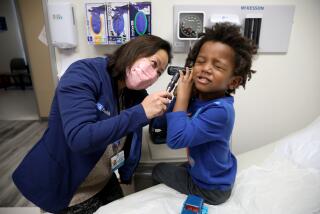Health Care System Is Hurting Everyone : * National Problem Now a Reality for Orange County
- Share via
In case there’s any doubt that “them” is really “us,” take a look at Orange County’s health care system for the poor. There you will find not just people who are at the bottom of the economic ladder--the so-called “underclass”--but a growing number of people who have never considered themselves anything other than middle class.
They may be out of work after having been laid off jobs that provided health insurance, or they may be working for employers who don’t offer insurance and they can’t afford to purchase it on their own. As described in a recent Times article by staff writer Leslie Berkman, that means that many of them end up trying to find treatment for illnesses and injuries at the county’s already overburdened community clinics.
Failing all else, they find themselves in emergency rooms. But a growing number of hospitals are pulling out of emergency care. They report they no longer are able or willing to pick up the tab for emergency care for people who can’t afford to pay their bills, or that they have trouble finding enough physicians to be on call, especially if they have many patients who are not paying.
Two hospitals, Santa Ana Hospital Medical Center and College Hospital Costa Mesa, have closed their emergency rooms because of a lack of on-call physicians.
Fewer emergency rooms, by the way, means an overall reduction in medical care for everyone, not just the uninsured and poor.
According to a UCLA School of Public Health study based on the 1990 Census, 22% of Orange County residents under age 65--and about the same percentage of all Californians--have no health insurance. That ranks the county as second in the state for uninsured, non-elderly persons.
There must be a better way.
Indeed, making health insurance more widely available is coming to the front of the political agenda across the nation. In Pennsylvania, Democrat Harris Wofford won a stunning upset in a special Senate election last year after he ran on a platform demanding healthcare reform. The issue also attracted more attention in Sacramento this year, even while legislators were diverted by the state’s budgetary troubles.
Some in Sacramento say there has been hesitation to approve major reforms within California in part because Democrats, who control both houses of the Legislature, hope that Arkansas Gov. Bill Clinton might be elected President.
Clinton has said that if he makes it to the White House he will propose phased-in universal coverage in which employers would be required to either provide insurance or buy into a public program. But, even if there is a change in presidential administrations, help from Washington may be slow in coming.
Meanwhile, the number of people in Orange County who are falling far enough behind to be eligible for Medi-Cal or Indigent Medical Services--the two insurance programs available to the indigent--continues to grow. That shows the degree to which a national problem has come home to roost in a county generally perceived as being relatively well off. The challenge for the county will be to cope with new realities even as there are fewer dollars available to help those most in need. Pressure for change must come to a large degree from the electorate, just as in Pennsylvania.
But for that to happen, voters must see that the current health care system is suffering in a way that hurts everyone, not just the poor. They must also see that a system that leaves uninsured so many people eventually may collapse under its own weight.
More to Read
Sign up for Essential California
The most important California stories and recommendations in your inbox every morning.
You may occasionally receive promotional content from the Los Angeles Times.










